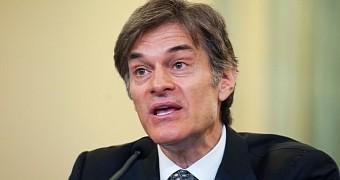Dr. Oz may be one of the most popular talk show hosts these days, and he’s definitely the most popular doctor on TV, but his work on television is generating a lot of controversy. Dr. Oz has not been having the best of years in this sense.
In 2014, he appeared before a Senate panel on the safety of the consumer and was accused of misleading his audience into buying hack products that didn’t have the results he claimed they did. The other day, word got out that a group of doctors had sent a letter to Columbia University to have him dismissed from the faculty list.
He’s not taking all this lying down.
Dr. Oz speaks, defends himself
In the aforementioned letter, the doctors accused Dr. Oz of lacking integrity and putting personal financial gain over the health and wellbeing of his audience, to whom he peddled quack cures and silly methods of improving their life that had no scientific backing.
This was reason enough to have him dismissed from his position as Vice Chair of the Department of Surgery at the Ivy League university, the letter argued. Columbia disagrees and has issued a statement to say that Dr. Oz is staying put, by the way.
At the same time, Dr. Oz too is speaking out: in a statement to People magazine, he insists that he’s not selling his audience the products / methods he’s presenting, he’s just keeping them informed by telling them of their existence.
“I bring the public information that will help them on their path to be their best selves,” he says. “We provide multiple points of view, including mine which is offered without conflict of interest. That doesn't sit well with certain agendas which distort the facts.”
That last part is a reference to an older dispute between Dr. Oz and agriculture company Monsanto, which is on the market of genetically modified seeds. Dr. Oz believes GMO products should be labeled as such, which has led some to conclude that he doesn’t believe that they’re healthy.
In his statement, he says that he never took such a position in regard to GMO foods: he never said they were bad, but that doesn’t mean that the customer should be made to buy them without knowing what he or she is buying.
The Monsanto link
Dr. Oz doesn’t say a word about the letter sent to Columbia University, and not because he already knew he wouldn’t be fired: he didn’t need to.
People magazine notes that there’s a link between the Monsanto dispute and the letter in question, through the person who wrote it, Henry I. Miller, M.D., Robert Wesson Fellow in Scientific Philosophy & Public Policy at Hoover Institution, Stanford University.
Miller is an advocate of GMO foods, has played a significant part in California’s “No on Prop 37” campaign, which blocked a law that would have mandated that all labels contain mentions for GMOs. He also praised Monsanto in a 2014 NYT op-ed for the advances made in this field, with the piece coming across like a veiled, paid endorsement.
In the spirit of keeping his audience well informed, Dr. Oz promises he will discuss more about GMOs in next week’s shows.

 14 DAY TRIAL //
14 DAY TRIAL //